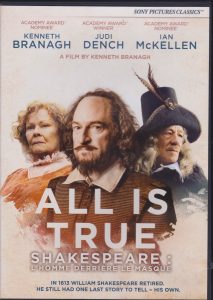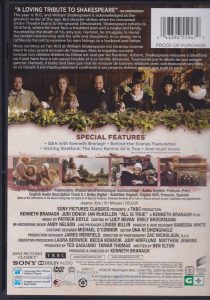After all his Shakespeare roles, he finally directs himself and plays Shakespeare in All Is True, his timely 2019 pre-pandemic (because of the movie’s references to the Black Death) take on the missing information about Shakespeare’s retirement and family life, shot in an amazing 30-day schedule.
Imaginatively written by Ben Elton, based on the skimpy available information on Shakespeare’s life, this is a totally unexpected tale about the Bard with unexpected twists and turns–all rendered relatively plausible within the narrative framework Elton sets up.
Shakespeare finally returns home to Stratford after the Globe Theatre burns down in order to plant a garden in honor of his son Hamnet who died mysteriously. He believes that his son had writing talent and this is the first of several assumptions to be unpacked about the family he doesn’t really know or understand.
His older daughter is not happy in her marriage, his younger, poorly-educated, but talented daughter does not want marriage for several reasons, and all the family is not happy despite the wealth he has bestowed on them from his London successes. As a result, Shakespeare experiences one disillusionment after another and there is much to do with psychology as he deals with his family’s and his own motives for his long absence from Stratford. Eventually, though, the crises and challenges are met and he accepts and is resigned to the changes wrought by the sudden epiphanies and setbacks.
Branagh makes a splendid Shakespeare in both appearance (based on the famous, popular Chandros portrait) and character. Judi Dench plays the wise, long-suffering illiterate wife Anne. Ian McKellen makes a surprise appearance at the Shakespeare’s home as the elderly, snobbish Earl of Southampton, the subject of the famous sonnets, and he and Branagh memorably trade nuanced versions of “When in disgrace with fortune and men’s eyes”. There are also many other quotes and allusions scattered throughout this film.
The rest of the actors, especially the daughters, are all well-cast and get into their roles effectively. The sets (an actual Tudor house for the family home), realistic cinematography, and Patrick Doyle’s dramatic music (he of Branagh’s Henry V) richly infuse the atmospherics, look, and sounds of this entertaining film. Spoiler: it’s conceivable that Branagh might have stopped the film with the reunion of Shakespeare and his ghostly son, but, instead, the Elton-Branagh collaboration serves up three more worthy ironic scenes that give a fuller, more politically-correct, wish-fulfillment ending. And the latter is hard to begrudge Shakespeare after all he goes through!
On many counts, this is a satisfying and provocative view of the Shakespeare we will all never know. Elton’s script is easy to empathize and sympathize with. All of the family characters get a fuller realization and their moments in the sun. And quite a few of the details, especially about the various scandals, turn out to be based on facts.
Overall, I found this movie more realistic, engaging, and interesting than Shakespeare in Love and Rupert Graves’ A Waste of Shame (based on speculations about the sonnet characters). There are also several fun supplements included on the DVD (including a half-hour interview with Branagh) that give more information about the facts, dramatization, and production. Ultimately, this is a very likable, warm Shakespeare bio and one of the nicer movies Branagh has ever made: easily one of his best and most memorable. Indeed, a well-executed labour of love worthy of The Bard


